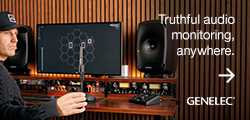 Symetrix used InfoComm to launch its Jupiter line of installed sound DSP products – a ‘zero learning curve turnkey audio processing platform drawing its inspiration from the apps paradigm of smartphones like Apple’s iPhone’.
Symetrix used InfoComm to launch its Jupiter line of installed sound DSP products – a ‘zero learning curve turnkey audio processing platform drawing its inspiration from the apps paradigm of smartphones like Apple’s iPhone’.
Jupiter hardware is available in three versions differing only in their input/output counts. Jupiter software apps transform generic hardware into highly specific audio engines for operations including paging, automixing and loudspeaker management. The free software used to configure Jupiter hardware runs on the Windows operating system, where a selected apps main screen presents a view of the overall signal flow and processing modules. Clicking on a module reveals a concise graphic representation of complex audio processing that is easily understood. Jupiter apps are built from a growing library of signal processors including gain sharing and gating auto-mixers, matrix mixers, feedback fighters, ambient SPL computers, and filters (including FIR) among others.
Jupiter hardware configurations match up with specific system input/output requirements: Jupiter 4 is four-in/four-out; Jupiter 8 is eight-in/eight-out; while Jupiter 12 provides 12 inputs and four outputs. All inputs are software selectable for line- or mic-levels with phantom power. Supported external controllers include Symetrix ARC wall panels, binary or analogue control voltage inputs and outputs, and IP control of virtually all app parameters.
‘Jupiter is immensely flexible and capable of satisfying the core requirements of many small sound systems as well as the ancillary needs of much larger ones,’ says Paul Roberts, Symetrix Director of Sales and Sarketing. ‘By providing a mix of powerful DSP and ease of use, we feel that Jupiter marks a significant departure from business as usual.’
More: www.SymetrixAudio.com









